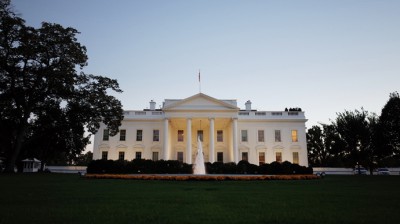Iran: White House Lied About Nuclear Agreement

The White House in Washington, DC (AFP Photo / Mandel Ngan)
Tehran has strongly rejected Washington’s interpretation of the long-awaited interim nuclear agreement reached by the P5+1 nations in Geneva, as Iran’s Foreign Ministry labeled the factsheet released by the US a “one-sided interpretation.”
The agreement, reached over the weekend in Geneva, outlines a framework for continued negotiations with Tehran, including a deal which is yet to be finalized. However, Iran now claims that the American factsheet, posted a few hours after the deal was announced on the website of the White House, has omitted some key points and is misleading the public by adjusting the language of the original agreement.
A spokeswoman for Iran’s Foreign Ministry, Marziyeh Afkham, came out with the following statementpublished by the Fars news agency on Tuesday:
“What has been released by the website of the White House as a factsheet is a one-sided interpretation of the agreed text in Geneva and some of the explanations and words in the sheet contradict the text of the Joint Plan of Action [the title of the Iran-powers deal], and this factsheet has unfortunately been translated and released in the name of the Geneva agreement by certain media, which is not true.”
The spokeswoman gave no further details.
Iran, together with the P5+1 nations – the five permanent members of the UN Security Council and Germany – agreed on Sunday that the former will curb a substantial portion of its nuclear activities for a period of six months, which will be spent finalizing the conditions of the deal.
In light of the recent crippling economic sanctions against Iran, Western parties agreed to lift some, including those on gold, precious minerals, the auto sector and petrochemical exports. According to the American factsheet, this is a potential $1.5 billion in revenue for Iran. Additionally, it could also be getting an additional $4.2 billion in oil revenues.
Furthermore, “$400 million in governmental tuition assistance [may also be] transferred from restricted Iranian funds directly to recognized educational institutions in third countries to defray the tuition costs of Iranian students,” DC officials told the Washington Free Beacon, which reported on the story.
However, a key aspect in Iran’s nuclear program – its ability to enrich uranium – was claimed by the Foreign Ministry to differ in nature from the US interpretation.
Some key points from Tehran’s version, which was published by Fars, are as follows:
“This comprehensive solution would enable Iran to fully enjoy its right to nuclear energy for peaceful purposes under the relevant articles of the NPT in conformity with its obligations therein.”
“This comprehensive solution would involve a mutually defined enrichment program with practical limits and transparency measures to ensure the peaceful nature of the program,” it also says.
And finally, the draft stipulates that “this comprehensive solution would constitute an integrated whole where nothing is agreed until everything is agreed.”
 (From L) Iranian Foreign Minister Mohammad Javad Zarif, Chinese Foreign Minister Wang Yi, US Secretary of State John Kerry, Russian Foreign Minister Sergei Lavrov and French Foreign Minister Laurent Fabius react during a statement on early November 24, 2013 in Geneva (AFP Photo)
(From L) Iranian Foreign Minister Mohammad Javad Zarif, Chinese Foreign Minister Wang Yi, US Secretary of State John Kerry, Russian Foreign Minister Sergei Lavrov and French Foreign Minister Laurent Fabius react during a statement on early November 24, 2013 in Geneva (AFP Photo)
Afkham went on to explain that the above Joint Plan of Action, which is four pages in length, includes terminology chosen in collaboration by all the parties to the Geneva agreement. The spokeswoman added that the accuracy and choice of words is the precise reason the P5+1 agreement took such time to finalize, with particular emphasis given to the importance of its phrasing by Tehran.
Early Sunday morning, however, saw the release of a markedly different text, prompting the Iranian Foreign Ministry to release what is says is the real version of the agreement.
The Washington Free Beacon spoke to White House officials, who said that the “P5+1 and Iran are working on what the timeframe is” adding that the final details of the draft agreement are still being ironed out. They declined to elaborate on what this means.
One thing that remains certain is while those details are being worked out, Iran retains the right to continue enriching uranium. Its right to do so has been the hottest subject of debate and is what landed it in hot water with the US, leading to Western sanctions.
Israeli leader Benyamin Netanyahu called the agreement a flat-out “mistake,” while US President Barack Obama, despite welcoming the deal, said the toughest sanctions will remain in place, while other offers listed in the agreement could easily be retracted.

